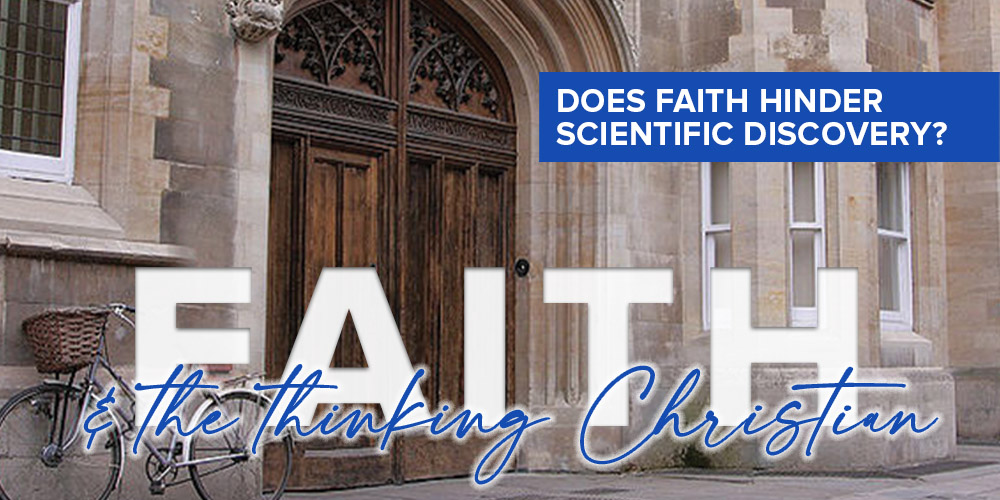 |
Back when folks wore hats and overcoats, they laid them aside when they entered a theater or restaurant. They would check their outerwear at the Coat Check so they could enjoy their activity unhindered. When finished, they would pick up their coats and hats.
Today scientists often hear that they need to do something similar when stepping into the laboratory. Scientists can’t be hindered by a supernatural worldview when researching the natural world. They must first check their faith at the door to keep it from getting in the way and then pick it up again as they leave the laboratory.
Scientists with a Christian worldview
James Clerk Maxwell—whom Einstein called the greatest scientist of the 19th century—missed that memo. Instead of checking his beliefs in Scripture at the lab door, Maxwell had a Bible verse carved into the door itself—at the entrance, not the exit! When Maxwell founded the famous Cavendish Laboratory of Cambridge University in 1874, he made sure that the Latin translation of Psalm 111:2 greeted all who entered: “The works of the LORD are great, sought out of all them that have pleasure therein” (KJV).
Maxwell is widely considered the third greatest physicist in history after Isaac Newton and Albert Einstein. His elegant equations of electromagnetism and kinetic theory of gases made Einstein’s theory of relativity and Plank’s quantum physics possible. His discoveries led to the technologies needed for radio, television, and radar. The Cavendish Laboratory was where the electron and DNA were discovered. Cavendish researchers were awarded more Nobel Prizes in the hard sciences than any other university.
Of course, not everyone who walked through the oak doorway at Cavendish brought along a Christian worldview, but many did, including eventual Nobel laureates. By one man’s research, 65 percent of all Nobel Prize winners in the 20th century were Christian or had a Christian background*.
That shouldn’t surprise anybody. That’s consistent with the history of scientific progress. Many scientists never found their Christian faith to hinder their work. Quite the contrary, their faith in the God revealed in his Word inspired their pursuit of understanding his work of creation.
Life as a Christian
Jesus doesn’t call us to check anything at the doors to our life’s various activities. Instead he said, “Love the Lord your God with all your heart and with all your soul and with all your mind and with all your strength” and “Love your neighbor as yourself” (Mark 12:30,31).
James Clerk Maxwell did, without separating his thinking as a scientist from his life as a Christian. Beyond being God’s servant as a scientist inside the lab, he loved others outside the lab: spending hours every day with his wife, serving as an elder at his church, tutoring struggling students one-on-one, and generally embodying the fruit of the Spirit from Galatians 5.
Read Jeremiah 8:2; 10:8-11; Deuteronomy 17:3; and Psalm 90:2.
It’s been stated that science could not make much progress in ancient times until Aristotle and Plato shed the culture’s pagan beliefs, revealing that gods don’t exist within nature itself. How were these Hebrew prophets well ahead of the Greek philosophers?
Modern science and, before it, Greek philosophy discredited superstitious beliefs that there are gods within nature who control how things work. But give credit where credit is due. The Lord, who transcends nature, dispelled such pagan lies much earlier! God exists apart from, and before, the created world that he brought into existence. He will not stand for people turning created things into gods that replace him. Moses and Jeremiah condemned pagan worship and, along with it, the superstitious notions of how nature worked.
It’s often forgotten that Martin Luther and the other Reformers did much to free the medieval worldview from Aristotelian philosophy, which severely hindered understanding God’s two books (as Augustine called them)—God’s Word and God’s works. Luther restored the proper hermeneutic to studying Scripture: The truth of Scripture would be uncovered by looking to the data or the text to let it say what it meant and mean what it said. He did not depend on the opinions or beliefs of others, even those who were revered as scholars. This is the historical-grammatical method of hermeneutics, which restored the truth of the gospel to the church.
But this freedom also led Christians who were scientists to apply the same approach to understanding God’s world. They would study the data to see what it said but then rest solely on the a priori assumptions handed down from Aristotle. The Lutheran Johannes Kepler changed science forever when he directly and meticulously observed the orbit of Mars and discarded the inadequate philosophy of Aristotle that had constrained it for centuries.
Read Genesis 1.
Agree/disagree: God’s revelation of how he created the universe makes scientific discovery possible and even encourages it.
Scientific discovery possible? Agree: God created the world in an orderly manner—forming the world in the first three days and filling it in the next three. The rhythm of God’s creating work in six normal days that cycle through light and darkness, along with the creation of the sun and moon as signs for days and seasons and years, show the orderliness of creation. Without such design and order, which we call the laws of nature and are expressed mathematically by scientists, we couldn’t carry out science as we know it.
Does Genesis 1 even encourage scientific discovery? Someone could disagree that God doesn’t command us to follow the scientific method per se or to summarize what we observe in creation as the laws of nature in mathematical formulas.
At the same time, it’s probably unhelpful and even arrogant of modernity to limit our definition of scientific discovery to the scientific method. Humanity has always explored the world in order to rule it as a steward of God’s creation at his direction (verse 26). We’re commanded to subdue the earth and rule over the created animals. It’s hard to subdue and rule the earth and its animals if we don’t strive to understand them as best we can. Scientific work, carried out as stewards of God, glorifies God and serves our neighbor.
Read Colossians 1:15-17 and 1 Corinthians 13:12.
How does knowing and trusting the supremacy of Christ help Christians be good scientists?
Trusting the supremacy of Christ in creation gives Christians who work in science the right balance of confidence and humility. They are confident that good science can be done because nature is the orderly work of a Creator who continues to hold all things together. But Christians are also humble because God’s ways are above our ways. His thoughts are above our thoughts. Our knowledge is only in part, as through a mirror dimly. We recognize that we are fallen and have only partial knowledge of things. Letting God be God and thanking him for what we can discover of the workings of his creation is one way we glorify Christ.
Christians also understand that science tells us the way things are, not the way things ought to be. If Christ is supreme over creation, he’s the Creator who tells us the way things ought to be through the revelation of Scripture and the writing of his law in our hearts. Creation cannot tell us things that only the Creator can tell us. This helps keep Christians humble when working as a scientist.
The author is among those who would encourage more Christians to pursue work in the sciences. Scientists are some of the most respected voices in today’s world. Defending the Christian faith should be done vocationally through the whole body of Christ. Let’s not consider the parish pastor the “Bible Answer Man” who is the best source for everything. Christians who have expertise in scientific fields have much to share of how their faith is a part of their work. Do you have scientists in your congregation? Take them out to lunch and ask them about their scientific work as a Christian.
This is the fourth article of a six-part series on faith and science.
*Baruch A. Shalev, 100 Years of Nobel Prizes (2003)
Author: James Borgwardt
Volume 108, Number 04
Issue: April 2021
- Faith and the thinking Christian: Part 6: Evolution and the thoughtful Christian
- Faith and the thinking Christian: Part 5: Home field advantage
- Faith and the thinking Christian: Part 4: Does faith hinder scientific discovery?
- Faith and the thinking Christian: Part 3: The misperception of scientific certainty
- Faith and the thinking Christian: Part 2: The limits of science
- Faith and the thinking Christian: Part 1: Science as servant






